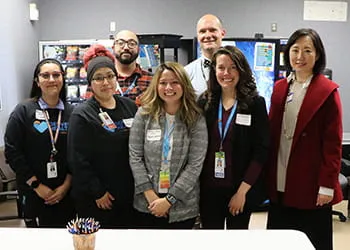December 13, 2022

Little things can mean the world to patients in the Access Transformative Outreach Program (ATOP) at Denver Health.
A pair of reading glasses. A USB flash drive. A phone call.
The pilot program helps Colorado Access members with severe substance use disorders who have been to withdrawal management (detox) or an emergency department more than 18 times in the past six months. The program aims to improve a patient’s quality of life through services offered and by reducing drug and alcohol use and the dependence on emergency departments and detox programs.
Importantly, ATOP Medical Director Ashley Curry, MD, said, “We meet our patients wherever they’re at.”
“For us to be the people who show up time after time for them, when maybe they don’t have people in other realms of their life showing up for them, I think that means a lot to the patients,” she said.
ATOP is a partnership between Denver Health and Colorado Access, a nonprofit health care company. The program, which started taking clients in August, has about 30 patients and capacity for 60. Many of them are experiencing homelessness, have significant medical or mental health conditions, and lack family or social support.
ATOP’s multidisciplinary care team has expertise in physical and mental health care, addiction treatment, and case management to help patients navigate areas such as housing and employment.
Sobriety, while a goal for some people in the program, is not required. ATOP staff – including psychiatrists, nurses, care navigators, case managers and peer support specialists – use motivational interviewing, harm reduction and verbal de-escalation to encourage patients to participate. The team tries to connect with patients at least three times a week, often out in the community.
Annie Lee, president and CEO of Colorado Access, said more programs like ATOP are needed. She hopes the partnership with Denver Health is just the beginning.
“This program is remarkable in that it is responsive to a critical need in our communities,” she said. “This gives us a chance to really connect on a different level, have a different kind of case management experience that really meets them where they are, that really looks to connect with what is going to work for them and fills the kinds of needs they may have in their lives.”
Lee added: “To be able to partner with an institution like Denver Health, a trusted resource for so many of our shared communities that we serve, is something that is much needed and a remarkable kind of symbol of the kind of partnership we want to be undertaking.”
ATOP program supervisor Allison Forrest said treatment plans are patient driven. While her team would like patients to want to get a job and housing and to stop drinking, that’s not always their goal.
A woman recently asked for a flash drive and to meet at a library. An ATOP team member met her, gave her a flash drive and some items to help keep her warm. Another meeting at a library was scheduled.
Another client has called every day to chat with a team member. He recently hung up by saying, “Love you guys. Bye.”
“We want attention for the people who are often overlooked,” Forrest said. “They matter. Just because of their circumstances doesn’t mean they don’t deserve the support. It’s just really important work.
“As you are, it doesn’t matter, we’re still here for you.”
Since potential patients are identified by service utilization patterns, the program is not accepting referrals currently. For more information about ATOP, email clinical@coaccess.com.

